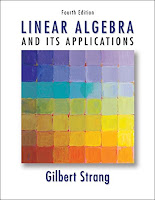The book that saved me
Last month marked the retirement of Prof. Gilbert Strang, the master of Linear Algebra at MIT. I had never seen him in person or on video. But I stumbled upon the recording of his farewell lecture today. The topic was quite ordinary--solving linear equations through matrix manipulation. But as he delivered it with a quivering voice and shaky hands--a sign of his old age (88)-- I sat there, with a wide smile across my face, and gratitude in my heart.
Over a decade ago, I was gearing up for an oral assessment to join the Ph.D. program at IIT. I stood nervously before a panel of professors, waiting for them to unleash technical questions. When they asked which subject I preferred, I declared, "Linear Algebra". I had studied linear equations, matrix tricks, and determinants. What could possibly go wrong? And then the next 30 minutes unfolded as a disaster. "What's a null space?", they asked. "How do you solve an overdetermined system?" I panicked. My lack of expertise in Linear Algebra dawned upon me, and I stood there dumbfounded and defeated. The professors adjourned the session. "Let's call it a day," they said. "We'll reconvene in two weeks. Be ready! Good luck!"
Leaving that room, my Ph.D. prospects felt shattered. My supervising professor called me into his office and asked, "What happened, Kedar?" Surprisingly, instead of focusing on my failings, he did something amazing: he told me to take the day off and start afresh the next day. "Focus only on your preparation the next two weeks," he said, "and don't worry about the other assignments." Later that day, a good friend swung by and recommended "Linear Algebra and Its Applications" by none other than Prof. Gilbert Strang.
For the next two weeks, I immersed myself in his book. What I learned was a revelation. Until then, my understanding of Linear Algebra had been confined to a geometric perspective. With geometry, visualizing anything beyond three dimensions is a futile exercise, and in those cases, I had relied on rote learning. The book opened my eyes to the multidimensional space represented by matrices. Step by step, it explored how matrix manipulation transformed this space. Once the basic concepts were clear to me, I discovered Linear Algebra's omnipresence--particularly in wireless communications.
Fast forward two weeks. I confidently passed my assessment. Interestingly, Linear Algebra played a minimal role in my doctoral thesis (which revolved more around probability theory--another pillar of wireless communications). But, it was later essential in my postdoctoral research.
Watching Prof. Strang's final lecture brought those memories back. His book stands as the definitive work on Linear Algebra, written in an approachable language. I am grateful to him for guiding me through this complex subject. Thank you, Prof. Strang.


Comments
Post a Comment